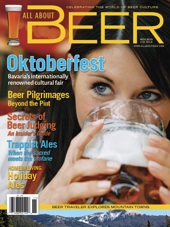To gauge the relative merits of American ales brewed with native yeasts against their Belgian counterparts, our tasting panel convened for a beerish walk on the wild side.
Flemish Primitive “Demon Fish”, 2006, De Proefbrouwerij, Lochristi, Belgium
A honey-gold farmhouse ale with fine suspended particulate, “Demon Fish” features a spiced apple aroma with a piquant taste of peppercorn and coriander against a faint vanilla backdrop. Earthy. At 55 IBU, it delivered stronger bittering than expected and yielded an essence of almond upon warming.
Bam Bière, Batch 291, 4.5% ABV, Jolly Pumpkin Artisan Ales, Dexter, MI, Ron Jeffries, head brewer.
A panel favorite for its champagne-like effervescence, thick white foam and airy lemon blossom aroma, Bam Bière has notes of fresh-cut flowers, honeysuckle, cereal and grains of paradise. A secondary fermentation in oak barrels exposed to native microbes lends wooden contours and a tart finish suggesting grapefruit rind.
Interlude, December 2007 bottling, 9.5% ABV, Allagash Brewing Co., Portland, ME, Jason Perkins, head brewer
Muted and sweeter than other farmhouse ales, Interlude gains gravity from the use of turbinado sugar. Tart and slightly syrupy with a slice of pear to the taste, Interlude is sunset-amber color and projects some alcohol in the nose. Its impressive 20-foot vertical clearance handily won the evening’s cork popping competition.
Cuvée de Jongleur, 8.1% ABV, Cascade Brewing/The Raccoon Lodge, Portland, OR, Ron Gansberg, head brewer
Brewed to the Flanders red tradition, Jongleur is a blend of several red ales aged up to 18 months in oak wine barrels with “free range Lactobacillus.” Clear auburn, with a velvety smooth head, the beer’s profound tartness can be measured at 3.4 pH and causes an instant contraction of the salivary glands. Pleasingly sour with a slight suggestion of vinegar. Available soon.
Skull and Bones Sour Wheat, 2003, 4.5% ABV, Bristol Brewing Co., Colorado Springs, CO, Jason Yester, head brewer
Pale yellow-gold with modest haze and a musty barnyard nose, Bristol’s Sour Wheat shows persistent carbonation after five years of experimental bottle conditioning. Native microbes fed by honey deliver crossover qualities combining the dank tartness of farmhouse ales with the acidic edge of sour reds. Shows clean, restrained flavor with tannic wheat dryness.
Cantillon Classic Gueuze, Brasserie Cantillon, Brussels, Belgium—a blend of spontaneously fermented lambic ales aged 1, 2, and 3 years
Warm, spun-gold with near absent carbonation. Aroma begins with a whiff of white vinegar that turns to “warm dustbin.” Acidic to the point of agitating the palate, yet genteel in its closure, its tartness strikes the jowls with a taste of shoelace baked in brine. Wine-like in demeanor. “Begs for a plate of cold chicken.”
Red “Belgian” Ale, 2006, Grey Parrot Brewing Co., Long Beach, WA, Phil Goularte, head brewer
Fermented exclusively with unidentified wild microflora. Unfiltered, bleary-eyed red with strong lactic souring. Notes of black cherry and cola nut with puckering tartness. Available winter 2010.
Special thanks to David Bradley of Widmer Brothers Brewing for hosting the event.











